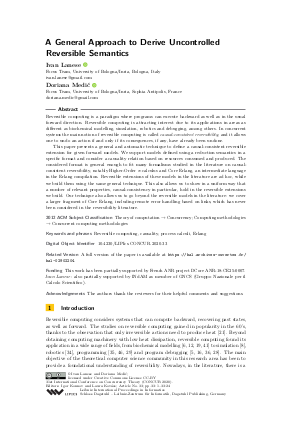@InProceedings{lanese_et_al:LIPIcs.CONCUR.2020.33,
author = {Lanese, Ivan and Medi\'{c}, Doriana},
title = {{A General Approach to Derive Uncontrolled Reversible Semantics}},
booktitle = {31st International Conference on Concurrency Theory (CONCUR 2020)},
pages = {33:1--33:24},
series = {Leibniz International Proceedings in Informatics (LIPIcs)},
ISBN = {978-3-95977-160-3},
ISSN = {1868-8969},
year = {2020},
volume = {171},
editor = {Konnov, Igor and Kov\'{a}cs, Laura},
publisher = {Schloss Dagstuhl -- Leibniz-Zentrum f{\"u}r Informatik},
address = {Dagstuhl, Germany},
URL = {https://drops.dagstuhl.de/entities/document/10.4230/LIPIcs.CONCUR.2020.33},
URN = {urn:nbn:de:0030-drops-128457},
doi = {10.4230/LIPIcs.CONCUR.2020.33},
annote = {Keywords: Reversible computing, causality, process calculi, Erlang}
}

 Creative Commons Attribution 3.0 Unported license
Creative Commons Attribution 3.0 Unported license

